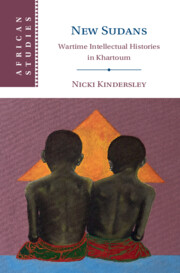Book contents
- New Sudans
- African Studies Series
- New Sudans
- Copyright page
- Dedication
- Contents
- Figures
- Acknowledgements
- Abbreviations
- Maps
- Introduction
- 1 Dar es Salaam
- 2 Building Marginalisation in the Displaced City
- 3 Community Space and Self-Defence
- 4 Alternative Education
- 5 Intellectual Work and Political Thought on the Peripheries
- 6 Akut Kuei and Wartime Mobilisation
- 7 Military Independence and Khartoum’s Warlord Communities
- 8 Return to the South, 2005–2011
- Conclusion
- Bibliography
- Index
- African Studies Series
5 - Intellectual Work and Political Thought on the Peripheries
Published online by Cambridge University Press: 06 February 2025
- New Sudans
- African Studies Series
- New Sudans
- Copyright page
- Dedication
- Contents
- Figures
- Acknowledgements
- Abbreviations
- Maps
- Introduction
- 1 Dar es Salaam
- 2 Building Marginalisation in the Displaced City
- 3 Community Space and Self-Defence
- 4 Alternative Education
- 5 Intellectual Work and Political Thought on the Peripheries
- 6 Akut Kuei and Wartime Mobilisation
- 7 Military Independence and Khartoum’s Warlord Communities
- 8 Return to the South, 2005–2011
- Conclusion
- Bibliography
- Index
- African Studies Series
Summary
This chapter explores the political theory within this educational work. It draws on self-produced works, cassettes, photocopied pamphlets, song sheets, and lyric books collected from people’s own archives as they returned from Khartoum, and the interviews, group translations, and discussions of these works and photographs conducted during their collection. These texts, poems, and songs are engaged in critiques of their authors’ economic, political, racial, and social circumstances; they build competing political philosophies and set out a spectrum of ideas about the future. Together the discussions across these projects centred on the possible shape and extent of a new political community rooted in common Black experience of exploitation and marginalisation, versus a political community drawing on more specific ethnic or localised parameters, based on a more conservative and pessimistic reading of the war economy and its futures. At the same time it contains shared common critiques of the civic and moral failings of the wealthy, apathetic, culturally promiscuous, and politically ignorant.
- Type
- Chapter
- Information
- New SudansWartime Intellectual Histories in Khartoum, pp. 178 - 229Publisher: Cambridge University PressPrint publication year: 2025

